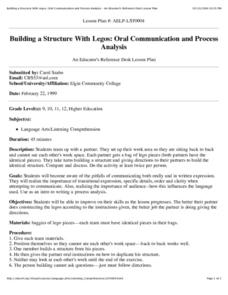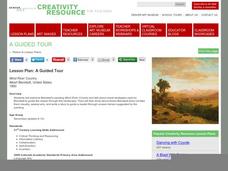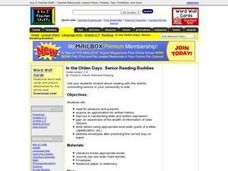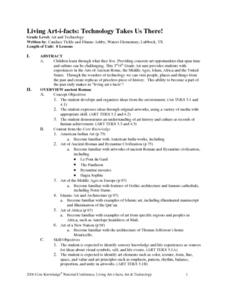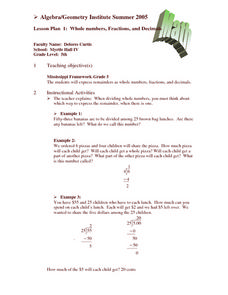Curated OER
Building a Structure With Legos: Oral Communication and Process Analysis
Illustrate the importance of specific details and clear directions. Sitting back-to-back, partners take turns building a Lego structure and giving directions to their partners to create an identical structure. The subsequent discussion...
Curated OER
Lesson Plan: A Guided Tour
Albert Bierstadt's painting Wind River Country shows viewers how a reader progresses through a story. Your class studies the light and dark areas, how the eye moves across the painting, and what attracts the audience to the work, and...
Curated OER
Poetry and Nature
Students observe an object in nature and record them. In groups, they create a group poem about the same object. They create their own poem based on another object using other their senses to help them. They share their poems with the...
Curated OER
Using Graphology to Teach Traditional Writing
Introduce your class to the narrative, descriptive and expository forms of writing. In groups, they discuss the personality of the author while graphing the characteristics after reading different examples from the same writer. To end...
Curated OER
Properties of Liquids
Students describe properties of liquids and use descriptive language as a springboard to develop precise vocabulary for properties of liquids. They also use vocabulary as practiced with liquid-vocabulary card games. Finally, students...
Curated OER
Twain: Icon and Iconoclast
Students examine work by Mark Twain in the context of pre- and post-Civil War America. In this cross curricular lesson, students gather biographical information about Twain, use a Venn diagram to compare and contrast him with...
Curated OER
In the Olden Days: Senior Reading Buddies
Students, in pre-selected groups, read and visit with senior citizen "buddies." They write letters to their buddies and discuss "the olden days."
Curated OER
The Clock Tower on Grand Avenue: A Cultural Reading Adventure
Sixth graders read three novels to practice their reading and comprehension skills. Using each novel, they create a list of the characteristics of each culture represented. In groups, they also identify the setting, characters and plot...
Curated OER
Emotion Masks
High schoolers analyze and discuss masks of different cultures as an art form to evoke emotion. This instructional activity culminates in the creation of individual mask designs and self-directed assessment (included).
Curated OER
Writing and Research with a Manatee Theme
Students use Internet research methods to find information about manatees. They write a story about a manatee, told through the manatee's eyes, and also a letter to an environmental group, thanking them for what they do to protect the...
Curated OER
Literacy Through Photography
Students practice using words to describe photographs they have taken. In this descriptive writing lesson, students utilize a disposable or digital camera to take 5 pictures of their life after school. Students create slides...
Curated OER
The Imagine Poetry & Mural Lesson
Readers of all ages can work together in groups to create original poetry on the theme of "Imagine," inspired by John Lennon's classic song. They also create a mural to illustrate their poetry. A beautiful lesson, inspired by a beautiful...
Curated OER
Un Séjour à Paris
Everyone dreams of going to Paris! Challenge your advanced French speakers to really get to know the city of lights. They use the plethora of worksheets provided to really explore the monuments, museums, and shops of Paris. They use a...
Curated OER
SIGHT READING RHYTHM PATTERNS
The perception of rhythms by reading and the ability to auditorily discriminate these rhythm patterns by listening to them performed by the teacher is practiced here. your students will work to create an eight-beat long rhythm pattern.
Curated OER
Living Art-i-facts: Technology Takes Us There!
Students create living artifacts dealing with different times and cultures. They explore Ancient Rome, the Middle Ages, Islam, Africa, and the United States.
Curated OER
Transition Words for Better Writing
Improve learners' writing, comprehension, and analytical thinking by teaching the use of transition words.
Curated OER
Whole Numbers, Fractions, and Decimals
Elementary and middle schoolers participate in an assignment to explore the concept of division and having a remainder. They also practice division problems using decimals and fractions without a remainder.
Curated OER
Developing Writing Skills Through Japanese Folk Music
Students listen to Japanese folk songs to get inspired to create a writing piece about Japan. In this writing lesson, students use primary and secondary sources to add information about Japan.
Curated OER
Nonfiction Genre Mini-Unit: Persuasive Writing
Should primary graders have their own computers? Should animals be kept in captivity? Young writers learn how to develop and support a claim in this short unit on persuasive writing.
Education Development Center
Consecutive Sums
Evaluate patterns of numbers through an engaging task. Scholars work collaboratively to determine a general rule reflecting the sum of consecutive positive integers. Multiple patterns emerge as learners explore different arrangements.
Curated OER
Like It Or Not?
Write a review of the film adaptation of Holes. After viewing the film, your young reviewers make recommendations about viewing the film. Using details to support their opinions, they highlight the important parts of the movie without...
Curated OER
A "Teacher Appreciation Week" Card for the Teacher
Anyone can create Teacher Appreciation Week cards for their teachers. This activity is designed to be incorporated with an art class. Learners will design a card and discuss ways to show appreciation for their teacher. Resource...
Utah Education Network (UEN)
Subtracting Integers
Review the concepts of additive inverses and adding positive and negative integers. Relate understanding to the subtraction of integers. This is done with either the use of "Algeblocks" (any square or tile manipulative should do) or...
Curated OER
The "Write" Stuff: Strategies and Conventions for Imaginative Writing
Fifth graders develop and practice the steps involved in imaginative writing. They follow the steps/worksheets included and write imaginative stories of their own.
